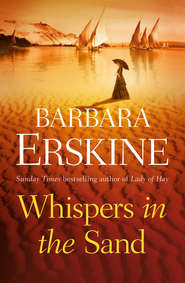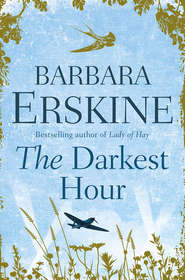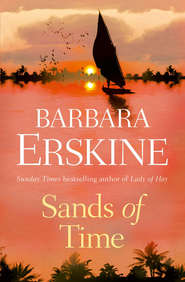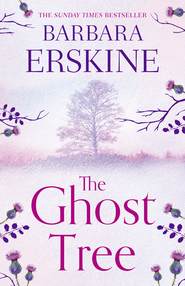По всем вопросам обращайтесь на: info@litportal.ru
(©) 2003-2024.
✖
On the Edge of Darkness
Автор
Год написания книги
2019
Настройки чтения
Размер шрифта
Высота строк
Поля
‘I saw Mistress Gillespie at the post office today. She said you hadn’t been down to play with the boys.’
‘No, Father.’
How could he explain the side-long looks, the sniggers?
He studied the pattern on his plate with furious concentration as if imprinting the delicate ivy-leaf design around the rim on his retinas.
‘Are you looking forward to starting school again?’ The minister was trying hard. His own eyes were red-rimmed and bloodshot, his hands shaking slightly. When his plate was only half empty he pushed the food aside and gave up. Adam couldn’t keep his eyes off the remains of his father’s supper. If he himself left anything he was normally the recipient of a lecture on waste and was told to sit there until he had eaten it. Seething with sudden resentment, he wished he dare say something, but he remained silent. The atmosphere in the room was tense. He hated it and, he realised it at last, he hated his father.
Miserably he shook his head as his father offered him a helping from the cold trifle left on the sideboard and he sat with bowed head whilst Thomas, clearly relieved that the meal was over, said a quick prayer of thanks and stood up. ‘I have a sermon to write.’ It was said almost apologetically.
Adam looked up. For a brief moment he felt an unexpected wave of compassion sweep over him as he met his father’s eyes. The next he had looked away coldly. Their unhappiness was, after all, his father’s fault.
‘A-dam!’ She had crept up beside him as he lay on the grass, his arm across his eyes to block off the glare from the sun.
He removed his arm and smiled without sitting up. ‘Where have you been?’
‘Hello, A-dam.’ She knelt beside him and dropped a handful of grass-seed heads on his face. ‘A-dam, shortbread?’ She pointed to the knapsack which lay beside him.
He laughed. ‘You’re a greedy miss, that’s what you are.’ He unfastened it and brought out the tin of shortbread. He was pleased she had remembered the word. He glanced round. ‘Gartnait?’
She shook her head.
As he peered round the cross-slab to see if her brother was there she wagged her finger. ‘No, A-dam. No go there.’
‘Why not? Where have you been? Why couldn’t I find you?’ He was growing increasingly frustrated at this inability to communicate with her properly.
She sat down beside him and began to pull the lid off the shortbread tin. She seemed uninterested in further conversation, leaning back on her elbows, sucking at the soft buttery biscuit, licking her lips. The sun came out from behind a cloud, throwing a bright beam across her face and she closed her eyes. He studied her for a moment. She had dark hair and strong regular features. When the bright, grey eyes, slightly slanted, were closed, as now, her face was tranquil yet still full of character, but when those eyes were open her whole expression came alive, vivacious and enquiring. Silver lights danced in her eyes and her firm, quirky mouth twitched with humour. She was peeping at him beneath her long dark lashes, conscious of his scrutiny, reacting with an instinctive coquetry that had not been there before. Abruptly she sat up.
‘A-dam.’ She was saying his name more fluently now, more softly, but with the same intonation which he found so beguiling.
He ceased his scrutiny abruptly, feeling himself blush. ‘It’s time we learned each other’s language,’ he said firmly. ‘Then we can all talk together.’
She moved, with a graceful wiggle of her hips, onto her knees and pointed down the valley the way he had come. ‘A-dam, big shortbread?’ she said coaxingly.
He burst out laughing. ‘All right. More shortbread. Next time I come.’
He hadn’t planned to follow her. He just couldn’t stop himself. He had spent the afternoon teaching her words, astonished by the phenomenal memory which retained faultlessly everything he told her. He taught her more trees and flowers and birds; he taught her the names of their clothes; he taught her arms and legs and heads and eyes and hair and all the items in his knapsack; he taught her walk and sit and run. He taught her the sky and the sun, the wind and the words for laugh and cry, and they had ‘talked’ and giggled and finished all the shortbread, and then at last she had glanced up at the sun. She frowned, obviously realising how late it was, and scrambled to her feet. ‘Bye bye, A-dam.’
He was taken by surprise. ‘But it’s hours until dark. Do you have to go?’
It was no use. She shrugged and turning, with a little wave, she dodged behind the stone slab and out of his sight.
He leaped to his feet. ‘Brid, wait. When shall I see you? When shall I come again?’
There was no answer. He ran a few steps after her and stopped in confusion. There was no sign of her. He retraced his steps to the spot where he had been standing and then turning, followed in her exact tracks. The afternoon seemed to have grown misty again. He stood, his hand on the stone, and peered ahead and suddenly there she was, running down the hillside in the thin sunshine. He set off after her, not shouting this time, deliberately following her at a distance and consciously noticing the way they were going.
She was following a clear track which he did not remember seeing before. He frowned, looking at the wood below him on his right. That was where the Scots pine should be. There were Scots pine, but too many – many many more than he remembered, unless they had already slipped unnoticed into a different valley. That was perfectly possible. One often did not see ridges and glens in the hills until one was upon them. He realised she was fast disappearing from sight and he plunged after her, aware of the strong smell of the heather and the baking earth and rock. Overhead a buzzard was calling, the wild yelping miaou growing fainter as it spiralled higher and higher until it was nothing but a speck in the blue.
The first he noticed of the village was the thin spiral of white smoke, almost invisible against the sky. He slowed down, trying to get his breath back, more cautious now. Brid was skipping unselfconsciously about a hundred yards ahead of him as he ducked behind some low whin bushes. She stopped and seemed to be gathering some flowers, then she moved on, holding them in her hand, more decorous now. He saw her surreptitiously rub some dust from her skirt and run her fingers through her hair.
He hesitated for a moment, then he ducked out of his hiding place and ran a few paces further on, to throw himself full length behind a small outcrop of rock. From there he peered at her again. Two figures had appeared on the dusty track and he could now see the village more clearly. It consisted of little more than a cluster of small round houses situated around a larger, central one. He squinted to see the figures better and recognised the taller of the two as Gartnait. The young man stopped when he saw Brid and waited for her. From the way he stood, the flailing of his arms and Brid’s sudden, obvious dejection, it was clear that Gartnait was angry.
Adam, who had been about to leap to his feet and admit to his presence, changed his mind abruptly. He lay where he was, his chin propped on his hands, watching. His vantage point allowed him to see the three figures – the third unknown to him – walk slowly back towards the village. Once there they stood and talked again animatedly for several minutes before at last ducking into a low doorway in one of the houses and disappearing from sight.
He stayed there for a long time, hoping someone would reappear. When it was clear they weren’t going to, he began to crawl slowly forward, taking advantage of the clumps of long dried grasses as the only reasonable cover to hide him. Once he heard a dog bark. He dropped flat, pressing his nose into the dry earth, smelling its hot peppery sweetness. After a few moments the barking stopped, abruptly silenced by a curt command, in what language he could not tell.
He waited, holding his breath. There was no further sound and he raised his head again to find himself looking at a pair of soft leather sandals. Leaping to his feet in fright he found himself half suspended by the collar, face to face with a tall, white-haired man with fierce dark eyes, a fine aquiline face and a narrow mouth set in a tight-lipped scowl. The man barked a question at him and Adam wriggled desperately, half angry and half afraid.
‘Let me go! I’m not doing any harm! Let me go! I’m a friend of Brid’s.’ He flailed out uselessly with his fists and the man put him down, transferring his iron grip to Adam’s wrist. Turning he strode towards the village, pulling Adam with him. The boy wriggled harder, his initial alarm turning to real fear. The look in the man’s eyes had been uncompromising and Adam knew that look well.
As they walked down the dirt track which served for a village street Adam saw faces at the doors. One by one the inhabitants appeared. Dark, shaggy-haired, dressed in strange bright-coloured woollen or leather breeches, the men were staring at him aggressively. Behind them he could see the women, most of them swathed in shawls, half hidden in the dark depths of the cottages, and suddenly he knew who they were. This must be a camp of tinkers – or real Romanies perhaps – from far away. He had seen tinkers, of course, in the village at home. Two or three times a year some of them would come, camping on the riverbank; they would mend the pots and pans of the housewives, and sharpen their knives, and then when the factor decided too many salmon had disappeared from the river they would move on overnight with their colourful vans and their ponies. He had heard that they had settlements somewhere over the hills where they went in the wintertime and this must be one of them. The realisation comforted him. Somewhere at the back of his mind had lurked a niggling fear about where Brid came from – a shiver, no more – something he couldn’t put a name to. To find out that she was a gypsy was a reassurance. The tinkers were always friendly. They got on well with the village children at home and the folk all got on well with them. Except for the factor of course, and the ghillies.
He stared round, trying to see Brid and Gartnait, and finally spotted them at the back of the crowd. He felt a surge of relief. ‘Brid!’ he cried. ‘Make him let me go!’ He wriggled, tried to bite the hand holding him and received a cuff on the ear for his pains. The tall man had followed his gaze and was also staring at Brid. He pointed at her and shouted a command. The men and women around her fell back. Brid looked terrified. Slowly she moved forward through the silent, staring crowd and came to stand in front of them.
‘Brid, tell him! Tell him I’m your friend,’ Adam begged. The man’s grip on his arm had not slackened. His head, Adam had noticed for the first time, was half shaven and there were dark tattoos on his forehead beneath the wild white rim of hair.
Brid shook her head. Covering her face with her hands she fell on her knees. Adam could see tears trickling from between her fingers. ‘Brid?’ He had stopped struggling, shocked by her abject terror.
It was Gartnait who stepped up behind her. He rested his hands gently on his sister’s shoulders and spoke to the tall man, his voice calm and clear.
Adam glanced from one to the other. Both men, he noticed, were wearing silver bracelets on their arms. Gartnait had a sort of necklet around his throat and beneath his cloak the short sleeves of his tunic showed that he too had intricately coloured tattoos on his arms and an intricately wrought golden band above his elbow. It made him look exotic and foreign. Very glamorous. Adam found his eyes going from one man to the other. His father disapproved of jewellery. He thought it an abomination, as he thought so many things were which were clearly nice or fun or beautiful. His mother owned none save her wedding ring. He had never seen a man wear jewellery save for the tinkers in the village who sometimes wore earrings, and Lord Pittenross who owned the estate and wore a gold signet ring with a carved crest on the little finger of his left hand. Adam, in spite of his fear, was impressed.
The tall man’s grip had slackened slightly as he stood listening to Gartnait and Adam snatched his arm away. He rubbed it defiantly, squaring his shoulders, feeling braver now. He gave Brid a quick grin but she was still kneeling with her hands over her eyes.
It was the turn of the tall man to speak now. He gestured at Adam, sweeping the boy with a withering look which took in his open-necked shirt, his shorts, his bare brown legs and his dusty sandals. It was then that the man pulled out a knife.
Adam gasped. Nearby, one of the watching women groaned. Gartnait went on talking calmly as though nothing had happened, but his fingers on his sister’s thin shoulders had tightened until the knuckles went white.
Brid took her hands away from her eyes. Her face was very pale. ‘Run, A-dam!’ she cried suddenly. ‘RUN!’
Adam ran.
He turned like an eel beneath the man’s flailing hand and diving through the crowd fled as fast as he could back the way he had come. His sudden movement had taken them all by surprise and it was a moment before the tall man started in pursuit. But he gave up almost at once. No one else had moved.
Adam did not wait to see what happened. He pounded up the track, jumping over stones and heather, leaping from rock to rock across the burn and slithering down a gully which took him out of sight of the village. At the bottom he lay still, gasping for breath. His heart was hammering somewhere in his throat and his legs were trembling with exhaustion and shock.
When at last he raised his head and looked around he half expected to see the tall man there again standing over him. There was no one there. The gully was deserted. Nearby he could hear a stonechat calling, its metallic voice an eerie echo of the sound of Gartnait’s hammer, and the distant slithering cascade of scree in the wake of his passing. Nothing else. He raised himself up and peered round carefully before climbing slowly up to the top of the rocks and looking behind him. There was no sign of the village. It was out of sight behind the shoulder of the hill and the heather and rocks were empty of any signs of pursuit. And of any landmarks he recognised.
He knew that to find his way home he needed to go south-east. He glanced at the sun, though he knew already which way he should go from the lie of the distant hills.
Not until the sun had set behind the shoulder of Ben Dearg did he admit at last that he was lost. He could feel the fear crawling in the pit of his stomach. The hillside looked familiar, but he could not see the stone. He could see no sign of anything he recognised. Feeling for footholds as silently as he could amongst the blaeberries and sliding scree he crept up to the rim of the gully and peered over the edge. The outline of the distant hills was the same as always, as were the contours of the glen below, but he could not see the cross-slab. In the distance he noticed suddenly the curl of smoke against the sky that showed the location of Brid’s village and he calmed himself down with an effort. After all, he had been exploring these hills with his friends since he was old enough to slip away from the village. What would his heroes do in these circumstances? Men like Richard Hannay or Sexton Blake, Alan Breck or the Scarlet Pimpernel? He didn’t have a compass but he would use his watch with the sun. With new determination he set off in what he hoped was the right direction, his back resolutely to Brid’s village, hoping that whatever was happening there she would not get into any further trouble because of him.
Wraiths of mist were curling through the trees when he at last found the stone cross again. It was the copy, the one that Gartnait was working on. He rested his hand on it, touching the sharp-edged carving of the looping intricate designs with his fingertips. Gartnait had stopped halfway through incising a broken spear. He could feel the shallow punch-marks outlining the design.
In the east, the deep amethyst dusk was beginning to hover over the valley. It hid the distances from sight, wrapping the whole area in darkness.
He stepped away from the stone, looking round for the older original, the landmark which had stood on the hill for fourteen hundred years. There was no sign of it. The air was very still.











